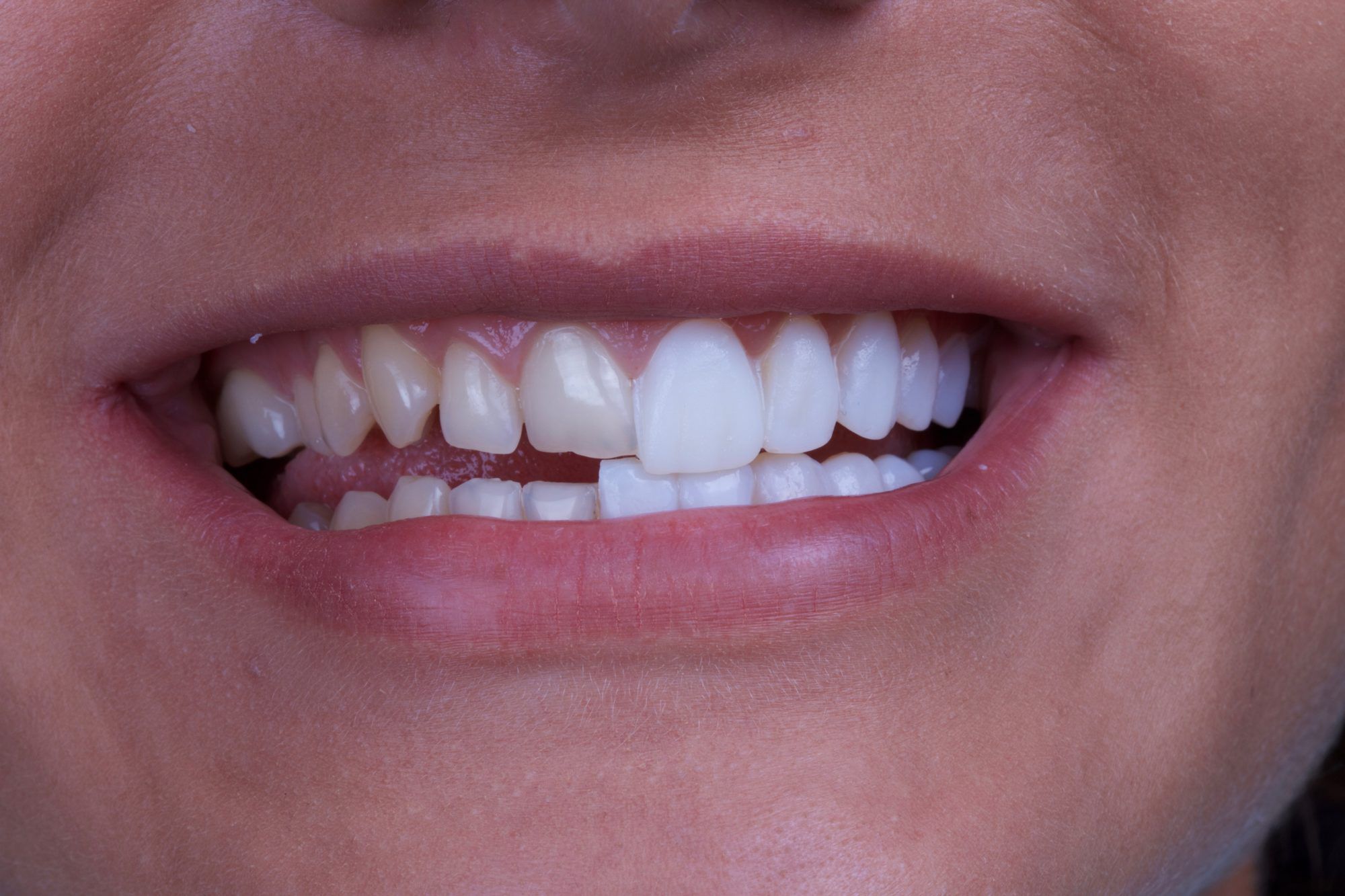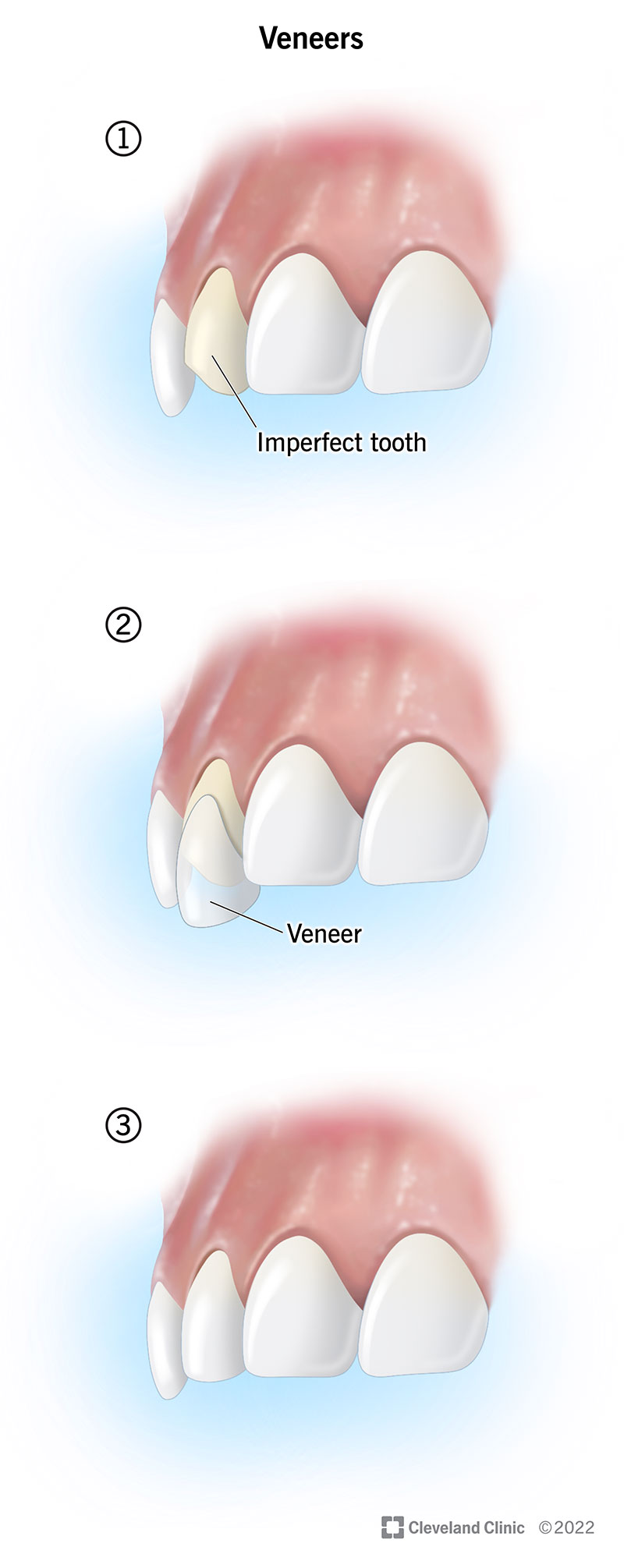Unlocking the Keys of Veneers: Realities, Kinds, and Advantages for a Gorgeous Smile
Veneers supply a compelling option for those looking for to boost their smiles. These dental improvements can resolve various imperfections, from staining to imbalance. With alternatives like porcelain and composite, people can pick based on their choices and demands. However, comprehending the subtleties of veneers, including application and treatment, is important. What variables should one consider before deciding? The answers might stun those interested in this visual dental option.

Recognizing Veneers: What Are They?
Veneers are thin, custom-made shells developed to cover the front surface area of teeth, improving their look. Typically crafted from sturdy products, these shells are tailored to fit each person's teeth specifically. They serve multiple objectives, consisting of dealing with visual blemishes such as discoloration, chips, or spaces. The application process entails a dental professional preparing the teeth, often by eliminating a percentage of enamel to guarantee a snug fit. Once prepared, the veneers are bound to the teeth making use of a strong adhesive.
Clients commonly pick veneers for their capacity to develop a natural-looking smile while offering a long-lasting service to oral flaws. Unlike various other aesthetic dentistry alternatives, veneers call for marginal invasive procedures, making them a popular option. The outcome is a better smile that can significantly increase a person's self-confidence and self-esteem. Overall, veneers offer an effective approach to accomplishing a more appealing and harmonious dental appearance.
Types of Veneers: Porcelain vs. Composite
When considering cosmetic oral options, two primary kinds of veneers stick out: porcelain and compound. Porcelain veneers are crafted from a durable ceramic product that simulates the all-natural appearance of teeth. They are known for their stain resistance and capability to mirror light likewise to natural enamel, offering a visual charm that several patients need. The application procedure typically entails even more preparation of the tooth framework and may need several visits to the dental expert.
On the various other hand, composite veneers are made from a tooth-colored material that is straight related to the teeth. This kind permits quicker application and can frequently be finished in a solitary check out. While they are more economical than porcelain veneers, they may not supply the same longevity or resistance to discoloration. Ultimately, the selection in between porcelain and composite veneers relies on individual choices, spending plan, and specific oral demands.
The Benefits of Deciding On Veneers
Picking veneers offers many advantages that can substantially boost both the aesthetics and performance of an individual's smile. One of the key advantages is their capacity to deal with flaws such as staining, voids, and misalignment, resulting in a much more consistent appearance. Veneers can likewise improve the sturdiness of teeth, supplying a safety layer that guards them from damage.
Furthermore, they require very little tooth preparation compared to various other oral procedures, protecting even more of the all-natural tooth structure. This conservation adds to a much healthier dental setting while still achieving a spectacular smile.
Veneers are extremely customizable, permitting people to select the form, dimension, and shade that finest fits their choices. Additionally, they are stain-resistant, making it simpler to preserve a attractive and brilliant smile over time. In general, veneers present an efficient option for those looking for both cosmetic enhancement and long-lasting dental health and wellness benefits.
The Veneer Application Process
The veneer application procedure includes several vital steps to guarantee suitable results. At first, a consultation is performed to evaluate the client's needs, complied with by the prep work and shaping of the teeth. Lastly, the veneers are adhered in position, with modifications produced an ideal fit and appearance.
First Appointment Steps
A comprehensive first assessment is important for anyone considering veneers, as it establishes the structure for an effective therapy. Throughout this conference, the dental specialist assesses the person's oral wellness, talking about any existing issues that could influence the veneer application. This assessment may consist of X-rays and a visual evaluation to establish the problem of the gum tissues and teeth.
The dental practitioner also engages the individual in a comprehensive discussion regarding their aesthetic goals, preferences, and expectations. They may present various veneer choices customized to the individual's details requirements. Furthermore, the professional explains the treatment, possible threats, and aftercare requirements, guaranteeing that the patient is comfy and knowledgeable prior to waging the therapy.
Preparation and Shaping Teeth
After the first assessment, the following phase includes the prep work and shaping of the teeth to fit the veneers. This important action is carried out by the dental practitioner, who meticulously analyzes the tooth structure to identify the quantity of enamel that requires to be gotten rid of. Usually, a slim layer, normally around 0.5 millimeters, is cut off to assure a correct fit for the veneers. Accuracy is extremely important throughout this process, as it influences both the aesthetic outcome and the general convenience. Once the teeth are appropriately shaped, impacts are required to produce personalized veneers that line up perfectly with the client's oral account. This precise preparation establishes the phase for an effective veneer application, improving both look and feature.
Bonding and Final Modifications
Following the shaping and preparation of the teeth, the bonding process begins, marking a vital stage in the veneer application. During this stage, an oral adhesive is related to the prepared tooth surface area, guaranteeing a strong bond between the tooth and the veneer. The dental expert thoroughly positions the veneer, making changes to accomplish the preferred positioning and visual appeals. Once effectively put, a special light is made use of to treat the adhesive, solidifying the bond. After treating, the dental professional performs last modifications, cutting any type of excess material and improving the veneer's shape to guarantee a natural look. This cautious focus to information boosts both function and aesthetics, adding to a general lovely smile that is sturdy and durable.
Caring for Your Veneers: Upkeep Tips
Taking care of veneers is necessary to preserve their look and longevity. A regular everyday cleansing routine, mindful avoidance of staining foods, and regular oral exams are crucial parts of effective upkeep. These methods help ensure that veneers continue to be in peak problem and remain to improve one's smile.
Daily Cleansing Routine
Routinely keeping veneers is vital for their durability and look. An appropriate day-to-day cleaning regimen can assist preserve their sparkle and prevent damage. Dental experts advise brushing twice a day with a soft-bristled toothbrush and fluoride toothpaste, making sure that all surface areas are cleaned up carefully to stay clear of scratching the veneer surface area. Flossing everyday is additionally crucial to eliminate food fragments and plaque from between teeth, where brushes might not reach. Additionally, utilizing an antimicrobial mouth wash can assist maintain oral hygiene without hurting the veneers. It is recommended to prevent rough cleaners and devices that can damage the veneer. By adhering to these simple actions, people can maintain their veneers looking attractive while promoting overall oral wellness.
Preventing Discoloration Foods
Although veneers are designed to enhance the appearance of teeth, their sensitivity to tarnishing necessitates this mindful dietary selections. It is essential for individuals with veneers to be conscious of specific foods and beverages that can bring about discoloration. Dark-colored items such as coffee, merlot, and berry juices must be consumed in small amounts, as they are understood to tarnish both all-natural teeth and veneers. Furthermore, acidic foods like citrus fruits can damage the bonding agents made use of in veneers, making them extra susceptible to discoloration. To preserve a brilliant smile, it is advisable to rinse the mouth with water after eating discoloration foods and to exercise routine oral health. These thoughtful selections add considerably to the durability and aesthetics of veneers.

Routine Oral Exams

Preserving the honesty of veneers needs a dedication to normal dental check-ups, as these appointments play an important role in guaranteeing their durability and look. During these check outs, oral specialists can evaluate the problem of the veneers, examining for any type of signs of wear, damages, or underlying oral problems. Additionally, routine cleansings aid eliminate plaque and tartar that can gather around the veneers, advertising total dental health and wellness. Dental experts can additionally provide individualized suggestions on care methods and products suited for veneer upkeep. By adhering to a timetable of exams, people can resolve possible troubles early, guaranteeing their smile continues to be dynamic and stunning. Eventually, regular dental check outs are an important component of veneer care.
Is Veneers the Right Choice for You?
Determining whether veneers are the right alternative often pivots on specific aesthetic objectives and dental requirements. For those seeking to deal with problems such as staining, chips, or misalignment, veneers can supply a transformative remedy. Candidates usually consist of people with healthy and balanced teeth however prefer a boosted smile.
However, it is vital to think about aspects such as tooth enamel problem, the extent of dental issues, and the readiness to keep veneers - Porcelain Veneers Dentist. Consulting with a dental expert is vital, as they can assess dental wellness and figure out if veneers appropriate
Furthermore, potential prospects should reflect on the lasting commitment, as veneers may require replacement every 10-15 years. Cost considerations likewise play a considerable duty, as veneers can be a substantial investment. Ultimately, the decision should be educated, balancing visual wishes with practical factors to consider index for lasting results.
Often Asked Concerns
How Much Time Do Veneers Normally Last Prior To Requiring Substitute?
Veneers normally last between 10 to 15 years prior to needing replacement. Factors such as oral hygiene, way of life selections, and worldly top quality can influence their longevity, making normal dental check-ups important for maintaining their problem.
Are Veneers Safe for People With Delicate Teeth?
Veneers can be risk-free for individuals with delicate teeth, however it frequently depends upon the extent of sensitivity and the dental expert's strategy. Consulting a dental expert prior to continuing is necessary to ensure perfect end results.
Can Veneers Be Gotten Rid Of or Replaced Quickly?

Do Veneers Spot Gradually, and Just How Can I Avoid It?
Veneers can discolor with time, particularly from foods and drinks like coffee or merlot. To avoid staining, maintaining good dental hygiene, utilizing a straw for drinks, and regular dental cleansings are advised techniques.
What Is the Cost Variety for Obtaining Veneers?
The price of veneers normally varies from $500 to $2,500 check it out per tooth, depending upon variables such as material kind, dental practitioner experience, and area. Individuals should speak with dental specialists for personalized quotes and financing options.
Once the teeth are adequately formed, perceptions are taken to create custom-made veneers that straighten perfectly with the individual's oral account. During this phase, an oral adhesive is applied to the prepared tooth surface, assuring a solid bond in between the veneer and the tooth. It is crucial to take right into account elements such as tooth enamel problem, the extent of oral problems, and the determination to maintain veneers. Veneers can be safe for people with delicate teeth, however it commonly depends on the intensity of sensitivity and the dentist's strategy. The price of veneers commonly varies from $500 to $2,500 per tooth, depending on factors such as material type, dental practitioner experience, and place.